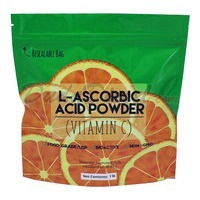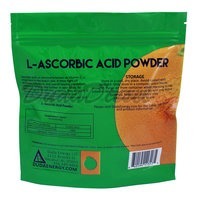L-Ascorbic Acid
99% Minimum Purity - Food Grade BP/USP Bioactive, Non-GMO
Chemical Formula: C6H8O6
Synonyms:
Vitamin C, Ascorvit, Vicomin C, Acorbate, Ascorbutina, Catavin C, Cevex, Secorbate, 3-Keto-L-gulofuranolactone; 3-oxo-L-gulofuranolactone
100% L-Ascorbic acid. This ascorbic acid is 100% formed by natural fermentation. It is NOT a mixture of D-ascorbic with L-ascorbic. (D-Ascorbic Acid is synthetically produced in a lab)
What is Ascorbic Acid?
Ascorbic acid is another name for Vitamin C. Vitamin C is important to the body's diet. It helps in healing and fighting off disease and infections. But it is also helpful in processing carbohydrates, proteins and fats. It helps the body generate blood vessels, collagen, muscle and cartilage.
Vitamin C is found naturally in fruits and vegetables. Sometimes a person's diet may not contain enough Vitamin C and could need Vitamin C supplements. It may be useful when traveling in places where fresh fruits and vegetables are not readily available.
Applications
Vitamin C powder can be consumed by mixing it with water. Be sure not to use high concentrations as it has a very sour taste. Some may prefer to sprinkle it over food or put tiny amounts on the tongue, followed by a glass of water.The powder is an effective form for people who cannot swallow pills.
Vitamin C may also be used to prevent oxidation. As an example in its use, it can be sprinkled onto fruits prior to freezing them to prevent the fruits from browning (a sign of oxidation).
Expiration Date / Shelf Life
Ascorbic acid is given a shelf life of 3 years from date of manufacture. After 3 years, ascorbic acid is usually found to have lost about 1-2% of its potency through oxidiation. A loss of potency means it will take more ascorbic acid to obtain the same effect as ascorbic acid which still has 100% effectiveness. Some loss of potency may occur prior to the expiration date if the ascorbic acid is exposed to air or sunlight. Keeping ascorbic acid tightly sealed, with minimal air and out of sunlight helps maintain its potency.
Dosages
It is recommended that men over the age of 18 consume 90mg of Vitamin C per day while for women over the age of 18 should consume 75mg per day. While slightly larger amounts of Vitamin C may not be harmful, usually consuming more than the needed Vitamin C will simply pass through the body without adequate processing. If very large amounts are consumed (over 2000mg) then it can actually harm the body.
How much is in a teaspoon?
This is a very common question. However, knowing how much is in a teaspoon is not very useful for measuring a daily dosage since a teaspoon contains over a month worth of nutritional value. A teaspoon amount is only useful for cooking recipes or when dividing the ascorbic acid into the volume of something bigger to be consumed over time (a container of water that can be measured again into smaller quantities). For direct daily intake, a pocket scale should be utilized for measuring out the milligrams (1000mg = 1g). In case you need to know how much is in a teaspoon, see the "density" paragraph below.
Density
The density of the 80 mesh ascorbic acid powder varies between 0.9-1.2 g/ml. There is about 5 ml in 1 US teaspoon. So there is a range of 4.5g-6g, or 4500-6000mg of ascorbic acid per teaspoon. If you are an adult male that needs 75mg of ascorbic acid, a teaspoon results in at least 6000% of your daily needed intake. To take the proper amount, you would need to consume no more than 1.67% of a teaspoon. This is impossible to measure and so we recommend to either mix this teaspoon into something else and divide that food up appropriately or to use a pocket scale with 0.01g reading accuracy to measure it out.
The Advantages of Ultra Fine Powder
Ultra fine powder has a much smaller particle size. The smaller particle sizes are much easier to dissolve into liquids and will also stay suspended in that liquid for a long time if it is in high concentration. When high concentrations of ascorbic acid need to be dissolved, the Ultra Fine powder is much easier to work with. When making Vitamin C serums for skin, hair or other external treatments, it's essential to use the Ultra Fine powder to keep the ascorbic acid suspended in the fluid for longer durations of time so that the fluid can be stored for later use.
About the Manufacturer



